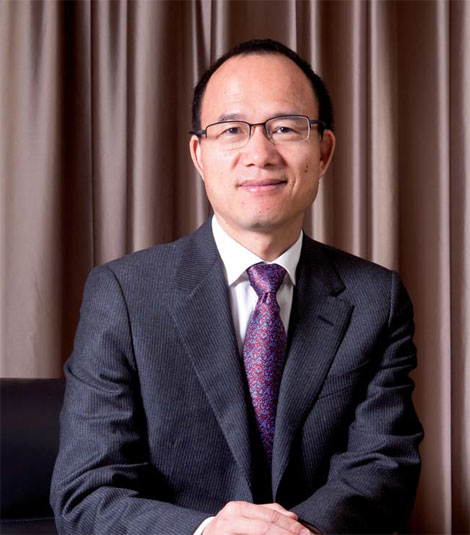Probe's effect on Fosun 'minimal'
Four-day disappearance of tycoon while he was reportedly helping authorities not expected to roil waters for Chinese investment
The brief disappearance of the man considered to be China's Warren Buffett while he was reported to be assisting authorities with an investigation is expected to affect neither the outbound investment of Chinese companies nor foreign firms' confidence in working with them, analysts say.
For several days, Guo Guangchang, chairman of the gigantic Fosun International investment company, could not be reached, causing concern and market turbulence for the firm.
|
Guo Guangchang, chairman of investment company Fosun International, is considered to be China's Warrent Buffett. Provided to China Daily |
Guo, however, attended the company's annual meeting in Shanghai on Dec 14, four days after the company said it was unable to contact him. He was reportedly assisting a judicial investigation before he reappeared and returned home.
He didn't comment on his disappearance or whether his assistance to authorities was finished. Guo opened the meeting by emphasizing that the group's growth remained rooted in China, and Fosun's investment model of "combining China's growth momentum with global resources" will be maintained.
He said Fosun will rely more heavily on China, and underlined that its industrial structure would be able to gain strength from that, and that it would also make continued efforts to build global operations. Fosun is one of China's largest domestic private investment companies.
Liang Xinjun, chief executive officer of Fosun, said in a conference call with foreign and domestic investors on the evening of Dec 13 that Guo was then in Shanghai and assisting with a judicial investigation.
He stressed in the conference call that Guo's involvement was a routine judicial procedure and that it did not indicate the company was in any trouble.
But listed companies related to Fosun International Ltd had a torrid day on the markets on Dec 14.
Even as the benchmark Shanghai Composite Index climbed 2.51 percent, both Hong Kong-listed Fosun International and Shanghai Fosun Pharmaceutical Co were hit with big slumps. Shares in Fosun International immediately dropped by 13.5 percent as the market opened, before recovering slightly to close at HK$12.04 ($1.55; 1.43 euros), a 9.75 percent fall. Shanghai Fosun Pharmaceutical dropped 11.04 percent to close at HK$22.15 per share.
Shanghai Ganglian E-commerce Holdings Co Ltd dropped 6.41 percent, while Shanghai Yuyuan Tourist Mart Co declined 2.39 percent.
Ratings agency Standard & Poor's says Guo's involvement in the probe would not affect Fosun's credit rating and outlook directly, but an "extended investigation" could negatively impact the firm's access to funding and any pending acquisitions.
During a previous interview with China Daily, Guo said he greatly admires billionaire US investment guru Warren Buffett, to whom he is sometimes compared.
"Fosun conducts an investment model of combining China's growth momentum with global resources. We want to become a premier global investment company. We have ambitions to manage assets of 1 trillion yuan ($154 billion; 142 billion euros), most of them overseas.
"We go to other countries to buy companies and help them develop their businesses in China. We have an advantage over our competitors in being able to offer opportunities in the fast-growing China market for the companies we invest in," said Guo.
Mei Xinyu, a researcher at the International Trade and Economic Cooperation Institute, says even though shares of Fosun's companies were negatively affected in the short term, the group's overseas investment should not be influenced much by the episode.
"The pending overseas projects might be undermined, yet since the company is a publicly listed company, as long as the investigation concerns Guo personally, rather than the company, it will not affect the outside confidence in this company," says Mei.
He also says it would not alter the trend of large numbers of Chinese companies going global, as seen in recent years.
"The increasing overseas investment is stimulated by China's Belt and Road Initiative, the acceleration of international industrial-capacity cooperation and a more favorable business environment. The trend is unstoppable," says Mei. The initiative aims to link China with Europe and other areas through trade and infrastructure.
For the first 11 months of this year, the Chinese mainland made around $104 billion in non-financial investments in overseas markets, a year-on-year increase of 16 percent, according to the Ministry of Commerce.
Outbound direct investment during the first 11 months covered almost all sectors, with $11.8 billion going to the manufacturing sector, increasing by 95.4 percent year-on-year, according to the ministry. Officials expect China to far exceed the target of 10 percent growth in ODI this year.
Lu Jinyong, a professor at the University of International Business and Economics in Beijing, says in the long run the outbound investment is a major trend and the effects of an episode such as Guo's case could be offset.
"Look at any nation - there are ups and downs for companies. Whether the overseas investment or international cooperation will be affected is mainly reliant on the whole country's economic development and Chinese market's attraction for the outside world," Lu says.
"The Chinese market has great potential, which is also clearly an advantage for Chinese companies as they look to develop business outside the country. Foreign companies' confidence in cooperating with Chinese companies will not be affected by such individual cases."
Shi Jing contributed to this story.
huhaiyan@chinadaily.com.cn



















